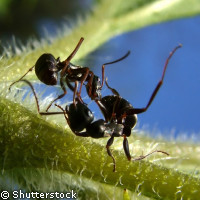Aggressive invasive ant species spreading in Europe, finds study
Indigenous European ant species are under threat by an aggressive ant variety native to Eurasia. According to new EU-funded research published in the online open access journal BCM Biology, the spread of the invasive garden ant, Lasius neglectus, is most likely the result of inadvertent human introduction and is already more advanced than previously assumed. It is the first known invasive ant to become established in the temperate regions of Eurasia. One hundred populations of Lasius neglectus, of which the native range is unknown but thought to be in the Black Sea region, have already been detected in Europe. They thrive in urban environments rather that natural habitats, and tend to be very aggressive to native species, killing off insects and spiders. The ants can survive mean winter temperature of -5°Celsius, so their range could potentially extend from Scotland to Japan. The researchers studied ant colonies in 14 locations across Europe, from Warsaw in Poland to Bayramic in Turkey, including locations in Belgium, France, Spain, Italy, Hungary and Germany. They analysed their genetic makeup as well as chemical and behavioural patterns and were thus able to reconstruct the ants' route of invasion on the basis of similarities between the colonies. Findings indicate that Lasius neglectus was introduced to Europe through only a handful of instances, but spread further from infested sites, as the 'existing introduced populations have a very high invasive potential', the study states. 'Many more infestations of the garden ant are likely to have taken place already, but have remained undiscovered due to the usual lag phase for invasive species to become established,' Dr Sylvia Cremer, one of the study's authors, points out. 'We hope that our present study will contribute to establish greater awareness of this pest ant, so that new infestations can be exterminated before they become damaging,' Dr Cremer states. The study was partly EU-funded through the INSECTS ('Integrated studies of the economy of insect societies') research training network and an individual Marie Curie Intra-European Fellowship. It involved researchers from three different European universities: the University of Copenhagen, Denmark; the University of Regensburg, Germany; and the University of Keele, UK. Like most of the world, Europe has already seen its fair share of invasive insects and other non-indigenous species cross into its territory. This includes plants, a large number of sea-dwelling creatures, insects, birds, mammals and reptiles. The species are usually introduced through human travel, while rising global temperatures promote their spread and their survival in the new environment.



